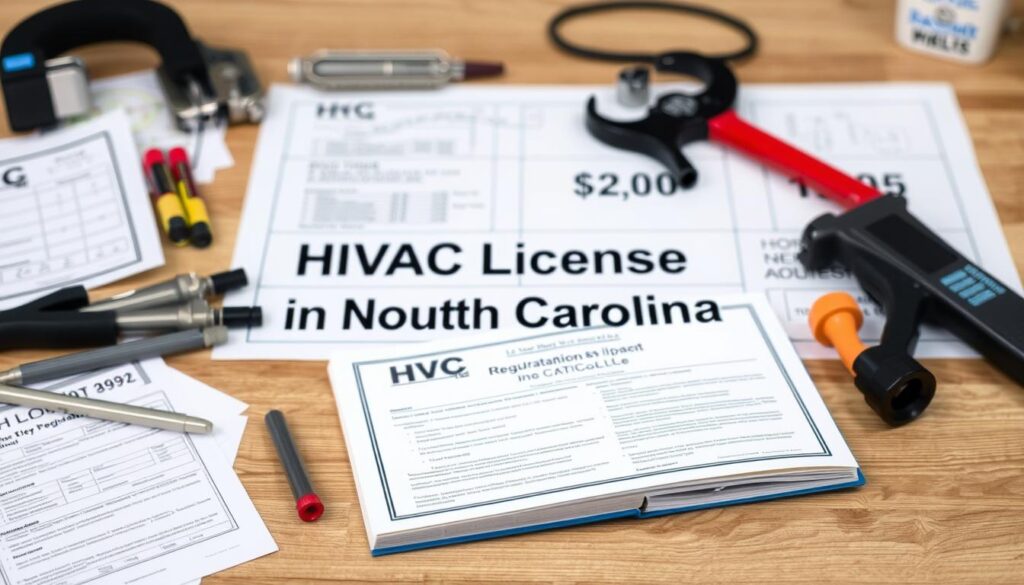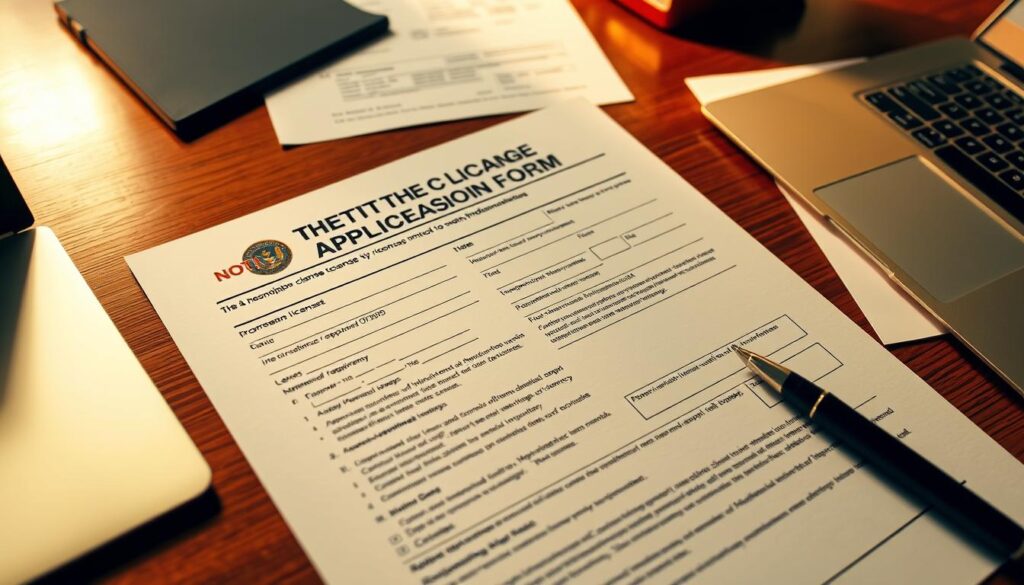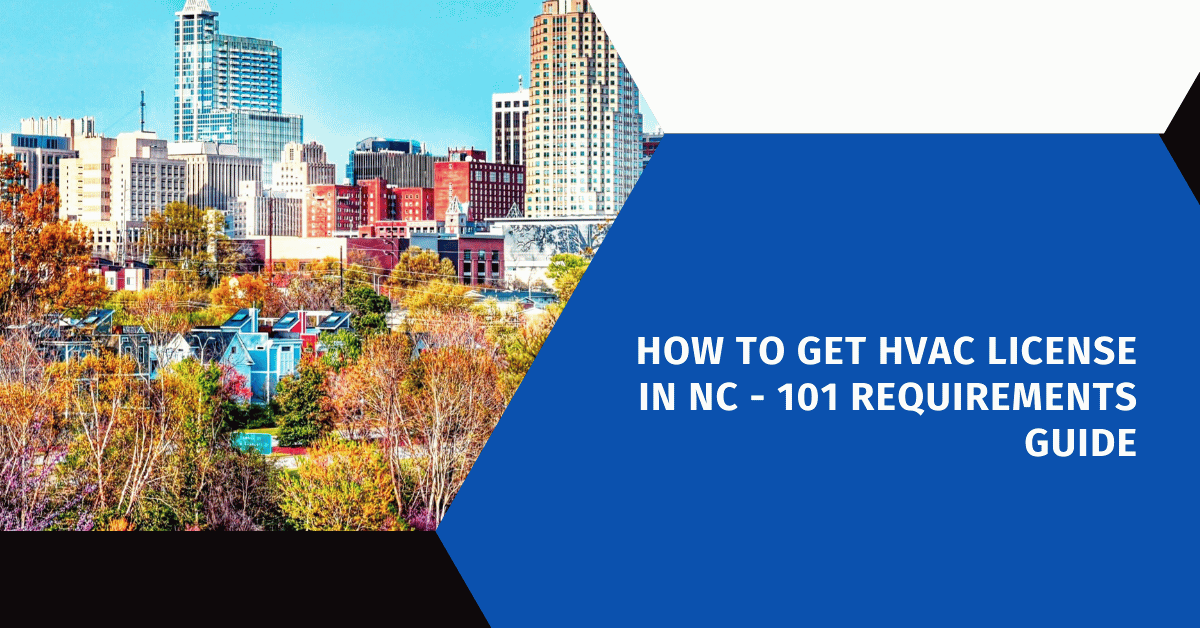Affiliate Disclosure
HVAC Guide Guys is a participant in the Amazon Services LLC Associates Program, an affiliate advertising program designed to provide a means for sites to earn advertising fees by advertising and linking to Amazon.
How to Get HVAC License in NC? If you’re new to HVAC or an experienced tech wanting to get certified, knowing the licensing process is key. The HVAC license NC rules help keep consumers safe and ensure high skills in heating, ventilation, and air conditioning.

Getting an HVAC license in North Carolina might seem tough. But with the right help, you can start or grow your HVAC career. This guide will show you how to get your North Carolina HVAC certification. You’ll learn all you need to become a licensed pro.
To become a licensed HVAC pro in North Carolina, you’ll need to go through education, training, exams, and meet state rules. Each step is important to show your skills and dedication to being the best.
Key Takeaways
- Comprehensive understanding of North Carolina HVAC licensing requirements
- Clear roadmap for obtaining HVAC certification
- Insights into educational and training prerequisites
- Understanding of examination and application processes
- Knowledge of legal and professional standards
Table of Contents
Understanding HVAC Licensing in North Carolina
Getting into HVAC can seem tough, but knowing the NC HVAC license rules is key. North Carolina makes sure HVAC techs are qualified. This ensures safety and quality service for everyone.
What Defines an HVAC License?
An HVAC license in North Carolina is more than a piece of paper. It shows a technician’s skill and dedication to excellent service. Getting certified proves you’re ready to handle complex systems.
- Demonstrates technical expertise
- Ensures compliance with state regulations
- Protects consumer interests
- Validates professional capabilities
Legal Framework for HVAC Professionals
North Carolina has strict rules for HVAC pros. These rules keep the industry high-quality. Your license shows you’ve passed tough tests and training.
Professional certification is not just a requirement—it’s your pathway to credibility and success in the HVAC industry.
Why Certification Matters
Getting your HVAC license can lead to more job chances and better pay. Employers and clients trust licensed techs. They show they’re committed to doing great work.
Types of HVAC Licenses Available in NC
North Carolina has different HVAC contractor classifications for various needs in the heating, ventilation, and air conditioning field. It’s important for professionals to know these NC HVAC license types to start their career in the state.
The main HVAC contractor classifications in North Carolina are:
- Refrigeration Contractor License: Focuses on commercial and industrial refrigeration systems
- Heating and Cooling Contractor License: Covers residential and commercial climate control systems
North Carolina also has two main HVAC contractor classifications:
- Class I Contractor License: Allows more comprehensive work with higher complexity projects
- Class II Contractor License: Provides authorization for smaller-scale installations and repairs
Your license type depends on your experience, education, and the work you plan to do. Each classification has its own rules and limits. Choose the one that fits your career goals in the HVAC industry.
Selecting the right NC HVAC license type can significantly impact your professional opportunities and earning potential.
Explore Our HVAC Shop
Looking for top-rated HVAC tools, parts, and accessories? Visit our shop and find the perfect solution for your needs.
Visit the ShopPrerequisites for HVAC Licensing
To get an HVAC license in North Carolina, you must meet certain requirements. These ensure you’re ready for the job. Before you start, know what you need to be eligible.
Age and Educational Requirements
To qualify for an HVAC license in NC, you need to meet some basic criteria. Here are the main requirements:
- Minimum age of 18 years old
- High school diploma or equivalent GED
- Completion of an accredited technical education program
NC HVAC Experience Requirements
Getting your HVAC license also depends on your experience. North Carolina has specific rules to make sure you’re skilled enough.
| License Type | Minimum Experience | Verification Method |
|---|---|---|
| Apprentice | 0-2 years | Supervised work documentation |
| Journeyman | 2-4 years | Verified work experience log |
| Master Technician | 4+ years | Comprehensive work history |
Background Check Process
As part of getting your license, you’ll need to pass a background check. This step checks your integrity and keeps everyone safe.
- Submit fingerprints for state and federal criminal record check
- Provide proof of legal work status
- Disclose any prior criminal convictions
Tip: Keep your work and education records up to date. It makes the licensing process easier.
How to Get HVAC License in NC
Getting an HVAC license in North Carolina needs careful planning and hard work. The process involves several important steps that you must follow well.
Your path to becoming a licensed HVAC pro starts with knowing the key steps. The steps to get a NC HVAC license can be divided into easy parts:
- Complete Required Education
- Sign up for an accredited HVAC training program
- Get a technical diploma or associate degree
- Gain Practical Work Experience
- Get verified work hours under licensed pros
- Keep records of your HVAC installation and repair experience
- Prepare for State Examination
- Study North Carolina’s HVAC laws
- Review technical and safety rules
- Submit Comprehensive Application
- Gather all needed documents
- Pay the required licensing fees
Precision and attention to detail are key in the HVAC license application process. Each step needs detailed documentation and following North Carolina’s specific rules.
Success in getting your NC HVAC license comes from careful preparation and sticking to professional standards.
By following these steps to get a NC HVAC license, you’ll be ready for a successful career in the HVAC field.
Explore Our HVAC Shop
Looking for top-rated HVAC tools, parts, and accessories? Visit our shop and find the perfect solution for your needs.
Visit the ShopEducation and Training Requirements
To start a career in HVAC, you need good education and training. In North Carolina, becoming a licensed HVAC technician begins with knowing your educational options.
The HVAC education in NC prepares you with the skills and knowledge for success. You have many educational paths to choose from.
Approved Educational Programs
North Carolina has strong HVAC training programs. They prepare you well for your future career. These programs cover:
- Electrical systems and controls
- Refrigeration principles
- Heating and cooling system design
- Energy efficiency techniques
- Safety protocols and regulations
Technical Schools and Community Colleges
Community colleges and technical schools are key for HVAC training. Here’s a look at what they offer:
| Institution Type | Program Duration | Certification Options |
|---|---|---|
| Community Colleges | 6-24 months | Associate Degree, Certificate |
| Technical Schools | 4-12 months | Professional Certification |
| Vocational Training Centers | 3-9 months | Skills Certification |
When picking HVAC training in NC, think about the curriculum, hands-on training, and industry connections. Accreditation is crucial to ensure your education meets professional standards.
Pro Tip: Choose programs with both classroom and workshop training to get the most out of your education.
HVAC License Application Process

Getting your NC HVAC license needs careful planning and detailed paperwork. The steps you take are key to getting certified.
Your HVAC certification paperwork must be complete and accurately submitted to the North Carolina licensing board. Gather all necessary documents before beginning the application to streamline the process and avoid potential delays.
- Collect all required educational transcripts
- Prepare proof of work experience
- Compile professional references
- Verify your completed training hours
The application typically requires the following key components:
- Completed official application form
- Verification of technical education
- Documented work experience
- Background check results
- Applicable licensing fees
When submitting your NC HVAC license application, double-check that every document is current and meets the state’s specific requirements. Incomplete or inaccurate HVAC certification paperwork can significantly delay your licensing process.
Pro Tip: Keep copies of all submitted documents and track your application status regularly.
Each application is carefully reviewed by licensing officials who ensure you meet all professional standards for HVAC certification in North Carolina.
Examination Requirements and Preparation
Getting ready for the HVAC license exam in NC can seem tough. But, with the right strategy, you can increase your chances of passing. The state test is a big step towards becoming a certified HVAC pro. It checks your technical know-how and hands-on skills.
Exam Structure Breakdown
First, you need to know what the exam covers. The North Carolina HVAC license exam has multiple-choice questions in several areas:
- HVAC system design and installation
- Electrical principles and wiring
- Local and state building codes
- Safety regulations
- Energy efficiency standards
Essential Study Resources
To prepare well, you need good study materials. Look into:
- Official state exam study guides
- Practice exams from accredited HVAC training programs
- Online tutorial courses
- Technical textbooks specific to NC licensing requirements
Make sure to study regularly and review your materials often. Many people spend 4-6 weeks studying hard for the exam. They focus on both theory and practical skills.
“Preparation is the key to success in your HVAC licensing journey.” – NC HVAC Licensing Board
Explore Our HVAC Shop
Looking for top-rated HVAC tools, parts, and accessories? Visit our shop and find the perfect solution for your needs.
Visit the ShopLicense Fees and Associated Costs
Understanding HVAC license fees in North Carolina is key for those starting their HVAC career. Knowing the cost of HVAC certification helps plan your budget for the heating and cooling industry in North Carolina.
Getting an HVAC license costs more than just the initial fees. You’ll also pay for exam charges and ongoing renewal fees.
| License Type | Initial Application Fee | Exam Cost | Renewal Fee |
|---|---|---|---|
| Class I Contractor | $150 | $85 | $100 |
| Class II Contractor | $125 | $75 | $85 |
When planning your HVAC certification budget, remember these extra costs:
- Educational program tuition
- Study materials and practice exams
- Continuing education courses
- Professional liability insurance
Your total investment could be $500 to $2,000. This depends on your education and license type. Good financial planning is essential to manage these costs.
License Classifications and Restrictions
Understanding HVAC license classifications in North Carolina can be tricky. The state has two main HVAC contractor classifications. Knowing these is key for planning your career and growing professionally.

North Carolina’s HVAC contractor rules set up different categories. These categories decide what you can do in your job. They help keep the industry in order and make sure everyone has the right skills for their work.
Class I Contractor License
A Class I HVAC contractor license lets you do the most work in North Carolina. You can:
- Work on all types of buildings
- Handle complex commercial and residential projects
- Install and service large-scale HVAC systems
- Perform work across multiple building types and sizes
Class II Contractor License
The Class II HVAC contractor license has more limits. It’s for more specific tasks. This license usually covers:
- Single-family detached dwellings
- Smaller residential projects
- Limited scope of HVAC installations and repairs
- Residential work with less complex system requirements
Choosing the right HVAC license depends on your goals, experience, and the projects you want to do. North Carolina’s HVAC market is competitive, so pick wisely.
Maintaining Your HVAC License
To keep your HVAC license active in North Carolina, you must follow renewal rules and continuing education standards. Your professional skills need regular updates to stay in line with state laws.
Renewing your HVAC license in North Carolina involves important steps. These steps help keep your professional status and legal work rights in the state. You must focus on two main areas: renewing on time and completing continuing education.
- Submit renewal application before current license expires
- Pay required renewal fees
- Complete mandatory continuing education hours
- Maintain current professional certifications
Renewal fees vary from $80 to $150, based on your license type. The North Carolina licensing board wants you to show you’re always learning and improving your skills through specific educational programs.
| License Type | Renewal Fee | Continuing Education Hours |
|---|---|---|
| Class I Contractor | $125 | 8 hours |
| Class II Contractor | $100 | 6 hours |
If you miss the renewal deadline, you might face fines or need more training. Managing your professional credentials well is crucial for your HVAC career in North Carolina.
“Staying current is not just about compliance, it’s about professional excellence.” – NChvac Licensing Board
Keep track of your renewal dates and plan ahead to avoid any breaks in your work. Your commitment to ongoing learning shows your passion for the HVAC field. It also keeps you up-to-date with the latest technology and rules.
Explore Our HVAC Shop
Looking for top-rated HVAC tools, parts, and accessories? Visit our shop and find the perfect solution for your needs.
Visit the ShopBusiness Requirements for HVAC Contractors
Starting an HVAC business in North Carolina is more than getting a license. You must meet specific business requirements to protect your company and clients. It’s important to understand HVAC business insurance NC and HVAC contractor bonding. These are key for a professional and legally compliant business.
Protecting Your Business with Insurance
HVAC business insurance NC is vital for your business. You need comprehensive coverage to protect against risks. Important insurance types include:
- General Liability Insurance
- Professional Liability Coverage
- Workers’ Compensation Insurance
- Commercial Vehicle Insurance
“Proper insurance isn’t an expense—it’s an investment in your business’s future.” – Professional HVAC Contractors Association
Understanding Contractor Bonding Requirements
HVAC contractor bonding is a financial guarantee of your professionalism. In North Carolina, surety bonds protect clients from financial losses. The bond amount depends on your license and project scope.
Typical bond amounts for HVAC contractors in NC are between $10,000 and $50,000. These bonds show your commitment to quality and give clients financial protection if needed.
Additional Business Considerations
There’s more to consider besides insurance and bonding:
- Register your business with the North Carolina Secretary of State
- Obtain a federal tax ID number
- Secure local business permits
- Maintain updated professional credentials
Pro Tip: Talk to a local insurance agent who knows HVAC contractor coverage. They can help ensure you have the right protection for your business.
Conclusion
Getting an HVAC license in North Carolina is a big step towards a successful career. The process might look tough, but it’s designed to prepare you for a rewarding HVAC career in NC. This career path offers great opportunities in the state’s growing market.
Getting certified brings many benefits, like more credibility, better pay, and more job chances. By completing your education, passing tough exams, and keeping your credentials up to date, you show you’re a reliable HVAC expert. This is crucial in a field that needs skilled and professional technicians.
Your hard work in getting and keeping a valid license shows you’re committed to doing great work. In a competitive market, being reliable and skilled is key. Your HVAC license proves your skills, knowledge, and integrity.
Remember, your HVAC license is more than a piece of paper. It’s proof of your abilities and dedication. Keep learning and use your credentials to grow a successful career in this important field.
FAQ
How long does it take to obtain an HVAC license in North Carolina?
What are the minimum age requirements for an HVAC license in North Carolina?
Do I need to have formal education to get an HVAC license?
How much does the HVAC licensing process cost in North Carolina?
How long does it take to obtain an HVAC license in North Carolina?
What are the minimum age requirements for an HVAC license in North Carolina?
Do I need to have formal education to get an HVAC license?
How much does the HVAC licensing process cost in North Carolina?
FAQ
How long does it take to obtain an HVAC license in North Carolina?
Getting an HVAC license in North Carolina takes 2-4 years. This depends on your education and work experience. You need to finish your education, get enough work experience (2-3 years), and pass the state exam to get your license.
What are the minimum age requirements for an HVAC license in North Carolina?
You must be 18 or older to apply for an HVAC license in North Carolina. This ensures you’re mature and responsible enough for the job.
Do I need to have formal education to get an HVAC license?
Formal education is not always required but is common. Most people get a technical program or associate degree in HVAC technology. These programs give you the knowledge needed to meet licensing requirements.
How much does the HVAC licensing process cost in North Carolina?
The cost varies but is usually between 0 and
FAQ
How long does it take to obtain an HVAC license in North Carolina?
Getting an HVAC license in North Carolina takes 2-4 years. This depends on your education and work experience. You need to finish your education, get enough work experience (2-3 years), and pass the state exam to get your license.
What are the minimum age requirements for an HVAC license in North Carolina?
You must be 18 or older to apply for an HVAC license in North Carolina. This ensures you’re mature and responsible enough for the job.
Do I need to have formal education to get an HVAC license?
Formal education is not always required but is common. Most people get a technical program or associate degree in HVAC technology. These programs give you the knowledge needed to meet licensing requirements.
How much does the HVAC licensing process cost in North Carolina?
The cost varies but is usually between $300 and $1,000. This includes application fees, exam costs, and education expenses. It covers initial fees, study materials, and training program tuition.
What types of HVAC licenses are available in North Carolina?
North Carolina has two main HVAC licenses: Class I and Class II. Class I is for bigger and more complex systems. Class II is for smaller projects, like residential or commercial ones.
How often do I need to renew my HVAC license?
HVAC licenses need renewal every two years. You must complete continuing education hours and pay a renewal fee to keep your license active.
What are the background check requirements for HVAC licensing?
You must pass a detailed background check. It looks at your criminal history, professional conduct, and work experience. Serious criminal convictions can affect your license eligibility.
Do I need insurance to operate as a licensed HVAC contractor?
Yes, you need insurance to work as an HVAC contractor in North Carolina. You must have general liability insurance and worker’s compensation insurance. The amount of coverage depends on your license and business size.
What happens if I let my HVAC license expire?
If your license expires, you have a grace period to reinstate it. You’ll need to pay a late fee and complete any missed continuing education. If you miss this window, you’ll have to reapply and retake the exam.
Can I work in HVAC without a license in North Carolina?
No, you need a valid HVAC license for most HVAC work in North Carolina. Working without a license can lead to fines and legal trouble.
,000. This includes application fees, exam costs, and education expenses. It covers initial fees, study materials, and training program tuition.
What types of HVAC licenses are available in North Carolina?
North Carolina has two main HVAC licenses: Class I and Class II. Class I is for bigger and more complex systems. Class II is for smaller projects, like residential or commercial ones.
How often do I need to renew my HVAC license?
HVAC licenses need renewal every two years. You must complete continuing education hours and pay a renewal fee to keep your license active.
What are the background check requirements for HVAC licensing?
You must pass a detailed background check. It looks at your criminal history, professional conduct, and work experience. Serious criminal convictions can affect your license eligibility.
Do I need insurance to operate as a licensed HVAC contractor?
Yes, you need insurance to work as an HVAC contractor in North Carolina. You must have general liability insurance and worker’s compensation insurance. The amount of coverage depends on your license and business size.
What happens if I let my HVAC license expire?
If your license expires, you have a grace period to reinstate it. You’ll need to pay a late fee and complete any missed continuing education. If you miss this window, you’ll have to reapply and retake the exam.
Can I work in HVAC without a license in North Carolina?
No, you need a valid HVAC license for most HVAC work in North Carolina. Working without a license can lead to fines and legal trouble.

